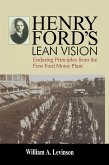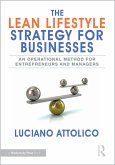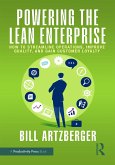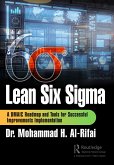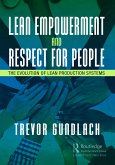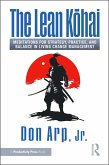William A. Levinson
Henry Ford's Lean Vision (eBook, PDF)
Enduring Principles from the First Ford Motor Plant
52,95 €
52,95 €
inkl. MwSt.
Sofort per Download lieferbar

26 °P sammeln
52,95 €
Als Download kaufen

52,95 €
inkl. MwSt.
Sofort per Download lieferbar

26 °P sammeln
Jetzt verschenken
Alle Infos zum eBook verschenken
52,95 €
inkl. MwSt.
Sofort per Download lieferbar
Alle Infos zum eBook verschenken

26 °P sammeln
William A. Levinson
Henry Ford's Lean Vision (eBook, PDF)
Enduring Principles from the First Ford Motor Plant
- Format: PDF
- Merkliste
- Auf die Merkliste
- Bewerten Bewerten
- Teilen
- Produkt teilen
- Produkterinnerung
- Produkterinnerung

Bitte loggen Sie sich zunächst in Ihr Kundenkonto ein oder registrieren Sie sich bei
bücher.de, um das eBook-Abo tolino select nutzen zu können.
Hier können Sie sich einloggen
Hier können Sie sich einloggen
Sie sind bereits eingeloggt. Klicken Sie auf 2. tolino select Abo, um fortzufahren.

Bitte loggen Sie sich zunächst in Ihr Kundenkonto ein oder registrieren Sie sich bei bücher.de, um das eBook-Abo tolino select nutzen zu können.
When the Japanese began to adopt these techniques from the Ford Motor Company during the early twentieth century, they knew exactly what they were getting: proven methods for mass-producing any product or delivering any service cheaply but well.
- Geräte: PC
- mit Kopierschutz
- eBook Hilfe
- Größe: 40.1MB
Andere Kunden interessierten sich auch für
![Henry Ford's Lean Vision (eBook, ePUB) Henry Ford's Lean Vision (eBook, ePUB)]() William A. LevinsonHenry Ford's Lean Vision (eBook, ePUB)52,95 €
William A. LevinsonHenry Ford's Lean Vision (eBook, ePUB)52,95 €![The Lean Lifestyle Strategy for Businesses (eBook, PDF) The Lean Lifestyle Strategy for Businesses (eBook, PDF)]() Luciano AttolicoThe Lean Lifestyle Strategy for Businesses (eBook, PDF)40,95 €
Luciano AttolicoThe Lean Lifestyle Strategy for Businesses (eBook, PDF)40,95 €![Lean Six Sigma (eBook, PDF) Lean Six Sigma (eBook, PDF)]() Terra Vanzant SternLean Six Sigma (eBook, PDF)45,95 €
Terra Vanzant SternLean Six Sigma (eBook, PDF)45,95 €![Powering the Lean Enterprise (eBook, PDF) Powering the Lean Enterprise (eBook, PDF)]() Bill ArtzbergerPowering the Lean Enterprise (eBook, PDF)33,95 €
Bill ArtzbergerPowering the Lean Enterprise (eBook, PDF)33,95 €![Lean Six Sigma (eBook, PDF) Lean Six Sigma (eBook, PDF)]() Mohammad H. Al-RifaiLean Six Sigma (eBook, PDF)48,95 €
Mohammad H. Al-RifaiLean Six Sigma (eBook, PDF)48,95 €![Lean Empowerment and Respect for People (eBook, PDF) Lean Empowerment and Respect for People (eBook, PDF)]() Trevor GundlachLean Empowerment and Respect for People (eBook, PDF)34,95 €
Trevor GundlachLean Empowerment and Respect for People (eBook, PDF)34,95 €![The Lean Kohai (eBook, PDF) The Lean Kohai (eBook, PDF)]() Don Arp Jr.The Lean Kohai (eBook, PDF)26,95 €
Don Arp Jr.The Lean Kohai (eBook, PDF)26,95 €-
-
-
When the Japanese began to adopt these techniques from the Ford Motor Company during the early twentieth century, they knew exactly what they were getting: proven methods for mass-producing any product or delivering any service cheaply but well.
Dieser Download kann aus rechtlichen Gründen nur mit Rechnungsadresse in A, B, BG, CY, CZ, D, DK, EW, E, FIN, F, GR, HR, H, IRL, I, LT, L, LR, M, NL, PL, P, R, S, SLO, SK ausgeliefert werden.
Produktdetails
- Produktdetails
- Verlag: Taylor & Francis
- Seitenzahl: 400
- Erscheinungstermin: 1. November 2024
- Englisch
- ISBN-13: 9781040283851
- Artikelnr.: 72279735
- Verlag: Taylor & Francis
- Seitenzahl: 400
- Erscheinungstermin: 1. November 2024
- Englisch
- ISBN-13: 9781040283851
- Artikelnr.: 72279735
- Herstellerkennzeichnung Die Herstellerinformationen sind derzeit nicht verfügbar.
William A. Levinson
IntroductionWhat to Expect from this BookBackground ResourcesChapter by
Chapter OverviewChapter 1: Brave New World: Changing How the World WorksThe
Bottom Line: Ford's Results Speak for ThemselvesDefining Lean
EnterpriseFord's Basic PrinciplesChapter 2: Ford's Principles: The
FoundationNatural LawFord and Eastern Philosophy: The Japanese
ConnectionContinuous Improvement: KaizenBringing Win-Win to the
WorkplaceServiceChapter 3: Ford on Labor RelationsManagement and Labor as
PartnersNo Free Lunch: A Key ConceptHuman Resource PracticesEmployee
Housing and StoresChapter 4: Principles for Organizational and Personal
SuccessPersistenceInitiativeBreaking Down Organizational BarriersCorporate
Culture at the Ford Motor CompanyHow the Ford Motor Company Lost Its
CultureChapter 5: Perceiving Genuine ValueA Warning to the United
StatesEverything Must Add ValueMiddlemen Do Not Add ValueAdvertising as
WasteNo Free LunchChapter 6: Ford on Economics, Government, and Health
CareBusiness CyclesThe Stock Market Should Be Irrelevant to National
ProsperityThe Role of Inexpensive EnergyThe Role of GovernmentHealth
CareChapter 7: Eliminate WasteEverything But the SquealISO 14000 Is
FreeChapter 8: Ford's FactoryThe Factory and the WorkerContinuous
Improvement: KaizenLean Manufacturing5S-CANDOJust-In-Time (JIT)
Manufacturing and Inventory ReductionDesign for Manufacture and Design for
AssemblyProcess Simplification and ImprovementPackaging and
DeliveryPoint-of-Use AssemblyOccupational SafetyQuality ControlChapter 9:
Customer and Supplier RelationshipsIdentifying Markets and Creating
DemandPricing StrategySupply Chain ManagementChapter 10: Frederick Winslow
Taylor and Scientific ManagementDid Taylor
Chapter OverviewChapter 1: Brave New World: Changing How the World WorksThe
Bottom Line: Ford's Results Speak for ThemselvesDefining Lean
EnterpriseFord's Basic PrinciplesChapter 2: Ford's Principles: The
FoundationNatural LawFord and Eastern Philosophy: The Japanese
ConnectionContinuous Improvement: KaizenBringing Win-Win to the
WorkplaceServiceChapter 3: Ford on Labor RelationsManagement and Labor as
PartnersNo Free Lunch: A Key ConceptHuman Resource PracticesEmployee
Housing and StoresChapter 4: Principles for Organizational and Personal
SuccessPersistenceInitiativeBreaking Down Organizational BarriersCorporate
Culture at the Ford Motor CompanyHow the Ford Motor Company Lost Its
CultureChapter 5: Perceiving Genuine ValueA Warning to the United
StatesEverything Must Add ValueMiddlemen Do Not Add ValueAdvertising as
WasteNo Free LunchChapter 6: Ford on Economics, Government, and Health
CareBusiness CyclesThe Stock Market Should Be Irrelevant to National
ProsperityThe Role of Inexpensive EnergyThe Role of GovernmentHealth
CareChapter 7: Eliminate WasteEverything But the SquealISO 14000 Is
FreeChapter 8: Ford's FactoryThe Factory and the WorkerContinuous
Improvement: KaizenLean Manufacturing5S-CANDOJust-In-Time (JIT)
Manufacturing and Inventory ReductionDesign for Manufacture and Design for
AssemblyProcess Simplification and ImprovementPackaging and
DeliveryPoint-of-Use AssemblyOccupational SafetyQuality ControlChapter 9:
Customer and Supplier RelationshipsIdentifying Markets and Creating
DemandPricing StrategySupply Chain ManagementChapter 10: Frederick Winslow
Taylor and Scientific ManagementDid Taylor
IntroductionWhat to Expect from this BookBackground ResourcesChapter by
Chapter OverviewChapter 1: Brave New World: Changing How the World WorksThe
Bottom Line: Ford's Results Speak for ThemselvesDefining Lean
EnterpriseFord's Basic PrinciplesChapter 2: Ford's Principles: The
FoundationNatural LawFord and Eastern Philosophy: The Japanese
ConnectionContinuous Improvement: KaizenBringing Win-Win to the
WorkplaceServiceChapter 3: Ford on Labor RelationsManagement and Labor as
PartnersNo Free Lunch: A Key ConceptHuman Resource PracticesEmployee
Housing and StoresChapter 4: Principles for Organizational and Personal
SuccessPersistenceInitiativeBreaking Down Organizational BarriersCorporate
Culture at the Ford Motor CompanyHow the Ford Motor Company Lost Its
CultureChapter 5: Perceiving Genuine ValueA Warning to the United
StatesEverything Must Add ValueMiddlemen Do Not Add ValueAdvertising as
WasteNo Free LunchChapter 6: Ford on Economics, Government, and Health
CareBusiness CyclesThe Stock Market Should Be Irrelevant to National
ProsperityThe Role of Inexpensive EnergyThe Role of GovernmentHealth
CareChapter 7: Eliminate WasteEverything But the SquealISO 14000 Is
FreeChapter 8: Ford's FactoryThe Factory and the WorkerContinuous
Improvement: KaizenLean Manufacturing5S-CANDOJust-In-Time (JIT)
Manufacturing and Inventory ReductionDesign for Manufacture and Design for
AssemblyProcess Simplification and ImprovementPackaging and
DeliveryPoint-of-Use AssemblyOccupational SafetyQuality ControlChapter 9:
Customer and Supplier RelationshipsIdentifying Markets and Creating
DemandPricing StrategySupply Chain ManagementChapter 10: Frederick Winslow
Taylor and Scientific ManagementDid Taylor
Chapter OverviewChapter 1: Brave New World: Changing How the World WorksThe
Bottom Line: Ford's Results Speak for ThemselvesDefining Lean
EnterpriseFord's Basic PrinciplesChapter 2: Ford's Principles: The
FoundationNatural LawFord and Eastern Philosophy: The Japanese
ConnectionContinuous Improvement: KaizenBringing Win-Win to the
WorkplaceServiceChapter 3: Ford on Labor RelationsManagement and Labor as
PartnersNo Free Lunch: A Key ConceptHuman Resource PracticesEmployee
Housing and StoresChapter 4: Principles for Organizational and Personal
SuccessPersistenceInitiativeBreaking Down Organizational BarriersCorporate
Culture at the Ford Motor CompanyHow the Ford Motor Company Lost Its
CultureChapter 5: Perceiving Genuine ValueA Warning to the United
StatesEverything Must Add ValueMiddlemen Do Not Add ValueAdvertising as
WasteNo Free LunchChapter 6: Ford on Economics, Government, and Health
CareBusiness CyclesThe Stock Market Should Be Irrelevant to National
ProsperityThe Role of Inexpensive EnergyThe Role of GovernmentHealth
CareChapter 7: Eliminate WasteEverything But the SquealISO 14000 Is
FreeChapter 8: Ford's FactoryThe Factory and the WorkerContinuous
Improvement: KaizenLean Manufacturing5S-CANDOJust-In-Time (JIT)
Manufacturing and Inventory ReductionDesign for Manufacture and Design for
AssemblyProcess Simplification and ImprovementPackaging and
DeliveryPoint-of-Use AssemblyOccupational SafetyQuality ControlChapter 9:
Customer and Supplier RelationshipsIdentifying Markets and Creating
DemandPricing StrategySupply Chain ManagementChapter 10: Frederick Winslow
Taylor and Scientific ManagementDid Taylor

